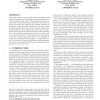Free Online Productivity Tools
i2Speak
i2Symbol
i2OCR
iTex2Img
iWeb2Print
iWeb2Shot
i2Type
iPdf2Split
iPdf2Merge
i2Bopomofo
i2Arabic
i2Style
i2Image
i2PDF
iLatex2Rtf
Sci2ools
111
click to vote
NSPW
2004
ACM
2004
ACM
A collaborative approach to autonomic security protocols
This paper considers a new security protocol paradigm whereby principals negotiate and on-the-fly generate security protocols according to their needs. When principals wish to interact then, rather than offering each other a fixed menu of ‘known’ protocols, they negotiate and, possibly with the collaboration of other principles, synthesise a new protocol that is tailored specifically to their current security environment and requirements. This approach provides a basis for autonomic security protocols. Such protocols are self-configuring since only principal assumptions and protocol goals need to be a-priori configured. The approach has the potential to survive security compromises that can be modelled as changes in the beliefs of the principals. A compromise of a key or a change in the trust relationships between principals can result in a principal self-healing and synthesising a new protocol to survive the event.
Related Content
| Added | 30 Jun 2010 |
| Updated | 30 Jun 2010 |
| Type | Conference |
| Year | 2004 |
| Where | NSPW |
| Authors | Hongbin Zhou, Simon N. Foley |
Comments (0)

